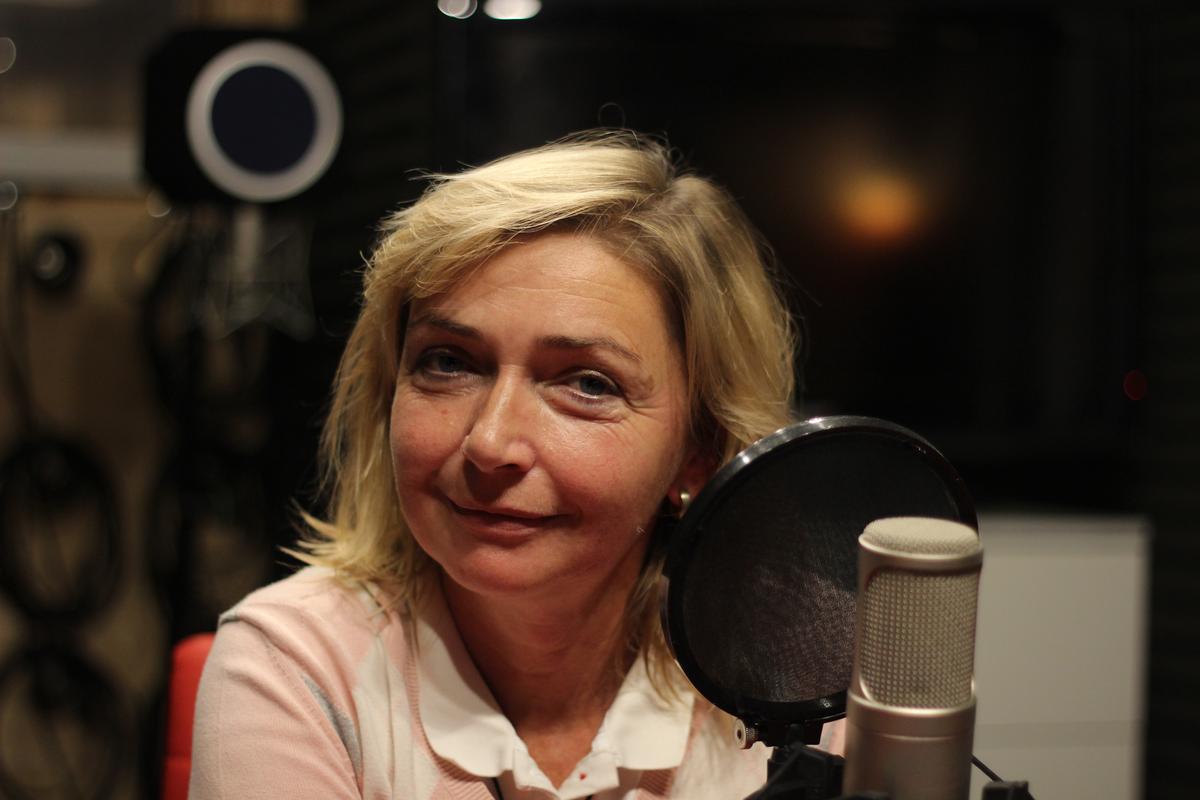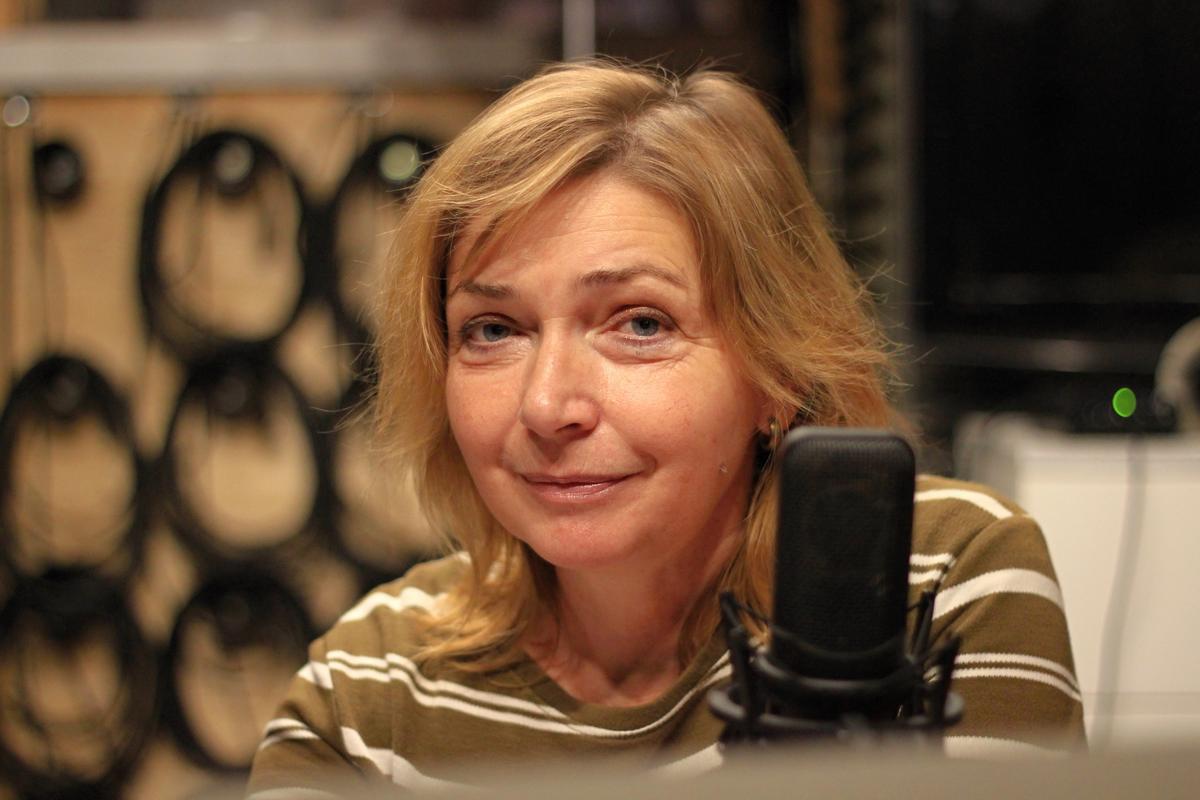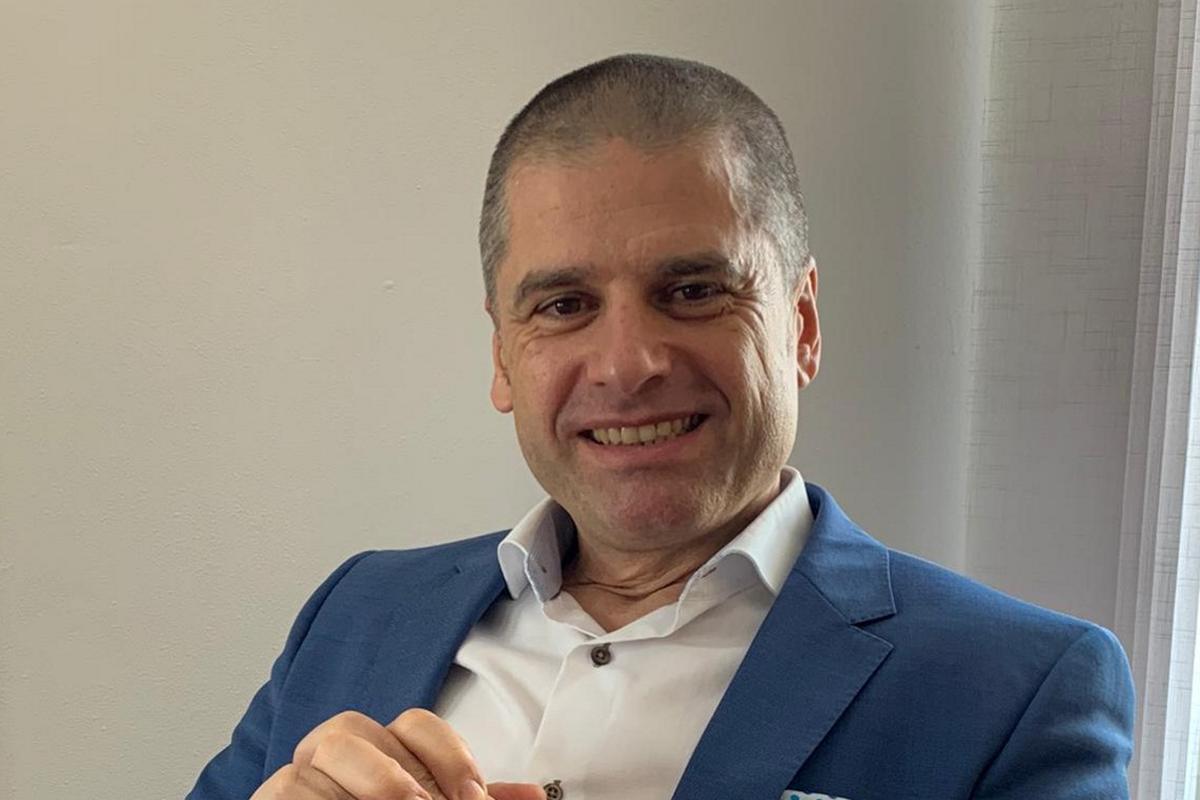How would you introduce yourself to our listeners and readers?
Officially, I would describe myself as a crisis manager in human resource management. But one of my former colleagues aptly called me the person who comes into companies to “spin plates.” This symbolizes that I bring positive energy and motivation to people to be open to change. But when the plates start to fall, I come again to encourage them to overcome those challenges.
And what does your company DMC management consulting do? Do you bring that energy here?
Our main motto is to help companies grow through people. We strive to help overcome crises and manage change and transformation. I see us primarily as a consulting firm that uses educational methods as a tool for making changes and for explaining their importance.
You started DMC with your sister. What’s it like working with a sibling?
I think we are very lucky because relationships are more important to us than the business itself. We can always get along, even though we’re each completely different, and that’s what makes us complement each other so well. We know each other’s strengths and weaknesses, so working with a sister is really a great gift.
How do you manage to maintain a work-life balance? Especially when you work with a sibling.
It’s not exactly ideal. My children and partner would probably confirm that I am more involved in my work than my private life. However, it’s interesting with my sister in that we really do act like colleagues during work hours, and when we’re done at work, we transition into a personal, sisterly relationship. So we don’t discuss family issues in the meeting, but only what needs to be resolved for the company.
You worked as a personnel director at Czech Television. What was your path to this position?
I have worked with Czech Television for several years before as an external consultant. I was invited by the management to work on various projects. For example, we carried out strategy workshops, team coaching and HR process audits. So CT was not completely new to me. However, the year 2021 was quite different as revenue was expected to decline and the promised fee increase was in sight. Czech Television was facing significant cost cutting. At that time, I was asked by management to help prepare management and the HR department for the crisis plan that was then being developed, and I helped find the necessary savings. Another requirement was to introduce modern human resources management tools.
When you look back at the period in Czech Television, what was successful, what was developed and what failed?
I am proud of the fact that we have developed a crisis plan and implemented major cost-saving measures that I don’t think have had a negative impact on employees. Successful projects include a new career site, an internship programme for high school students and a new benefits and remuneration system. Some projects did not sustain after I left, which I regret because our HR team spent a lot of time on them. We have also been mapping out processes for future digitalisation, which has not yet been successfully implemented.
What did your time at CT bring to DMC?
It was more of a problem for DMC because I more or less dropped out of projects from one day to the next. I’m very grateful to Marketa Šimáková, with whom I founded the company, for taking over the management of the company, and also to the consultants who have worked on my projects. When you go out of the normal routine for two years, the company naturally suffers. Our regular meetings for HR managers, where current topics are addressed, suffered because I didn’t have time for them. I think it had a rather negative impact for DMC.
And when you got back on the train, what projects were waiting for you?
At first I was worried that after a two-year hiatus it would take a long time to get involved again. I was surprised to find that I returned more quickly than I expected. In just 2 months I was and still am working on a very interesting project – the transformation of a company that has grown rapidly and is involved in health and social services. At the same time I was also working as an interim HR manager, so I didn’t really get much rest.
How do you assess the state of HR processes at your clients and where do you see opportunities for improvement? Where would you recommend to start with their modernization and digitalization?
Transformation is a key topic, especially after the crash, when old business models are crumbling and companies are looking for new ones. Digitalization and automation are essential for efficiency, but people are not sufficiently prepared for them, especially in HR. Processes need to be analyzed and optimized before digitalization so that dysfunctional processes are not automated.
How are people reacting to these changes? Do you feel their resistance?
People are resistant because they often cannot imagine what the change will look like in the end. In our Toyota Kata training, we call this the “grey area”. When people can’t imagine the outcome, they refuse to commit to the change. Our job is to help them overcome this grey area and show them what the situation will look like at the end.
Isn’t the natural reaction of people to be initially frightened by these changes?
It’s a natural reaction. That’s why we try to get people excited about change and walk them step by step through what’s ahead. It’s important to have positive energy and enthusiasm, without that you can’t do it. This energy is contagious.
How do you perceive the role of HR as a business partner? Is it just a feeling, or are there really any changes compared to the past?
HR today often acts as a partner in the organisation and the struggle for recognition is a thing of the past. At the same time, HR suffers from administrative and process overload, which detracts from employee care. In addition, there is a growing leadership problem in companies – there is a lack of time for people management, motivational interviewing, appraisals and feedback. HR should provide tools for managers, not replace their role in leading people.
What makes you think that? Why do managers shy away from what their job is?
I guess it’s because they’re all overloaded with their own tasks. There are few managers who realize that their tasks should not take precedence over the needs of the team. It’s a question of delegation and also a question of the speed of the times we live in. We want to do everything quickly and preferably alone, which leads to a decline in teamwork.
And don’t the management and owners of the company also play a role in this?
I don’t think so. I believe that success depends on the approach to leading people. We work with managers who understand that the success of the team is crucial, which is our motto: we achieve results through people. Our projects allow us to address strategic challenges, but the problem is the focus of advice on operational issues instead of long-term goals. Open discussion about the future is essential. It is also important to make objectives concrete and measurable. We often resort to vague slogans, but there is a lack of precise expression and measurable indicators. This is a key area that we are working on.
How do companies react to fundamental changes in the market? It reminds me of the effect of a frog in the water that slowly boils without being noticed. How do you see the risk of firms reaching a tipping point without being prepared?
We define three phases in training: the first is the ideal phase, where people predict problems. The second phase involves signals that we often overlook in the hope that the problem will resolve itself. It is not until the third phase, when the problem actually occurs, that we usually avoid acknowledging it, leading to difficulties and more costly solutions because we have overlooked the previous phases.
How crucial is the participation of top management in these programmes?
Top management is key. If we do such activities, for example with middle management, then it is more of a motivational workshop to help people clarify what they are after, what they want and what they need. But if top management doesn’t support this, nothing will change in the company. This is because it has to be a priority for top management.
You have already mentioned a methodology based on Lean management. What is the added value of these methods?
I’m known for falling for the Industry 4.0 training methodology and vision, which focuses on the psychological aspects of business and enables rapid change in routine. The other methodology we use in transformation projects is Toyota Kata. This method helps us to achieve difficult challenges through everyday small steps. Through training in the United States and Japan, we have begun to use Toyota Production System tools that can effectively bring about change in any industry and sustain it over the long term.
The origin of this methodology is in industry. You mentioned that these methods can be applied in other areas. Can these methodologies also be used in services?
The method is universal, but its application varies from company to company. I personally tried the Kata method on my HR team at Czech Television without explaining that I was using it. People felt comfortable and HR management became part of Lean management. We have also had positive experiences in the healthcare industry, where colleagues in the US and Western Europe have achieved great results with the TWI method, especially in training and fixing standards, which has helped, for example, to reduce infections in hospitals. I have yet to come across a field where the method has not worked.
Getting into healthcare is probably not easy, because it is a field that carries great risks. On the other hand, healthcare seems to be a field with big egos.
In this respect, it is about big hearts. I see that people really consider their work as a mission. The fact that there can be a big ego, who’s better and who’s worse, that shows up in all fields. But I see a big handicap in that systems management in healthcare is very different. Healthcare has not been managed as a business before, and if it starts to be managed that way, it will start to work. I know that’s not exactly a popular slogan, but I mean it. People in healthcare also need to have clear standards and systems that they can rely on, just like regular organizations in business.
What should companies, project sponsors, do to ensure that the change project they are working on with you reaches a successful conclusion?
It is important to first understand the goal of the project. Work with management to create a definition of the future state that clarifies expectations and action steps. We often find that management believes they no longer need us once the project is awarded, but regular meetings and discussions about deliverables are essential to success. Another important thing is to allocate time to the project; if this is not a priority, the project often stalls. Sometimes it is necessary to explain to people that long-term goals are more important than current problems.
That’s a bit abstract.
It’s really rather abstract. What I like about Toyota, for example, is that they are now creating standards for handling non-standard situations, which is a huge step. It means that they are practicing how to react in a standard way when something goes wrong. They simulate these situations and check that they can handle them. They’re really a few steps ahead.
In terms of project measurability, what metrics do you have in place for your partners and how can you measure that a training project has achieved its goals?
The rule is that if I don’t measure, I don’t drive. In order to judge success, we need measurable indicators, but sometimes these cannot be set with the client at the outset, especially if they are not working with KPIs. In such cases, we create metrics to manage the project. For example, for an employee onboarding change, we measure the speed of onboarding a new employee, turnover in the first three months, and achievement of performance standards. Often, we must first measure the actual length of the adaptation process in order to create a target state and teach managers how to properly measure and compare.
Does the fact that the labour market is changing, the shortage of workers and the entry of the digital generation, which has a different approach to work and different requirements, also interfere with your projects, or is it more of a media bubble?
The new generation has a really different concept of life, which is normal because we also had a different view of the world than our parents. It affects expectations in particular. The new generation will need more leadership, support, motivation and communication. The current leadership style is not sufficiently prepared for these needs. Managers will have to learn to lead people in a different way. The most common leadership style used to be directive, but today you can’t do anything about it. Now we are working on coaching and support, and in the future it will be about nurturing and individual attention to each employee’s performance. That’s just a change in leadership style.
I would like to ask you about your time at PPF at the turn of the 1990s and the new millennium. What was the atmosphere in the company at that time and what did this period mean to you?
Thank you for that question. I realized that we were actually a startup at the time. Today, we look at startups with skepticism, but PPF was a group of young people who handled challenging projects with ease. It was about trust and teamwork. We always had a common goal – to succeed, which contributed to our success.
You even served for some time on the board of Home Credit. What was your role?
Home Credit was a small Brno company that was bought by PPF. I was given the task of transforming the company. That was actually my main task. We were creating completely new processes, business model and marketing strategy, and we were launching new branches. So Home Credit was really at the beginning then, and my role was to get the HR management and the model right.
The HR Director is not often a member of the Board of Directors. What do you think about the fact that there is often talk that HR directors should go all the way to the board of directors?
Personally, I see the future of HR in the Czech Republic differently. The role of HR will evolve towards taking care of employees, ensuring a good working environment and creating conditions that motivate employees. We used to focus on creating processes and rules, now I believe HR will hire external consultants for unpopular actions, while the internal team will focus on individual approach to employees and their satisfaction. In the future, HR will be all about nurturing and supporting employees.
Let’s go back to the PPF period again. Your CV takes a significant turn in 2003 when you found DMC management consulting. You had a busy corporate career with very interesting projects. What was behind this change?
Markéta and I had a dream of owning a company and a clear idea of its direction. At the same time I was pregnant, and my daughter was born on the day we started the company. This gave me the motivation to change. The work at DMC is very diverse and it has given me the opportunity to meet interesting people from different fields, which was not possible in a corporate career. The decision to start a company was the right one, as I realise I am not the type for a corporate environment.
Can you mention projects that you remember fondly?
I could talk about all the projects for a long time, but I will start with the last one I am working on, which is a health and social care project aimed at the elderly who cannot take care of themselves. I consider this project to be a significant altruistic act by the owner of the company. Another interesting project took place a few years ago when, in cooperation with Jiřina Ledvinová, we made a significant change in the car company. We created a system to incorporate experiential pedagogy, which allowed us to quickly transform the structure of the company over a weekend.
You mentioned transformational projects and technologies. What role does technology play in DMC?
It is not true for us that “the smith’s mare walks barefoot”. During the downturn, we switched to cloud-based systems, allowing us to work from anywhere with an internet connection. We are now focusing on using artificial intelligence in recruitment and my daughter is providing that. We’re also digitising our services, previously on paper, and planning an integration with Power BI. While we are not technology experts, we are working hard to adapt to the needs of our clients who require digitization.
Do you have a life motto or principle that you follow in your daily corporate and personal life?
My personal motto is to do everything with enthusiasm and passion.






